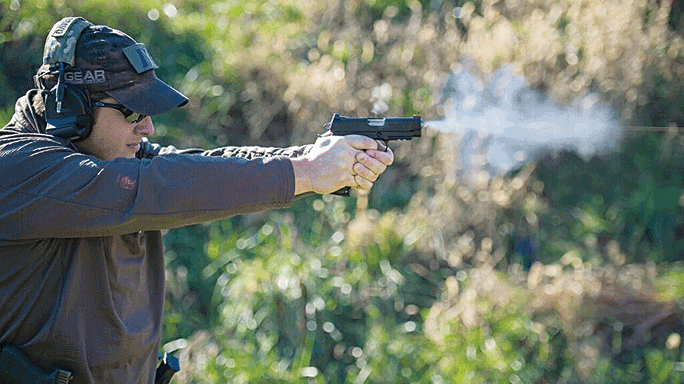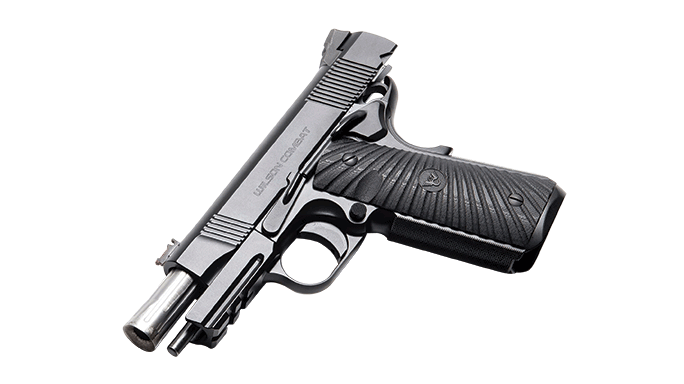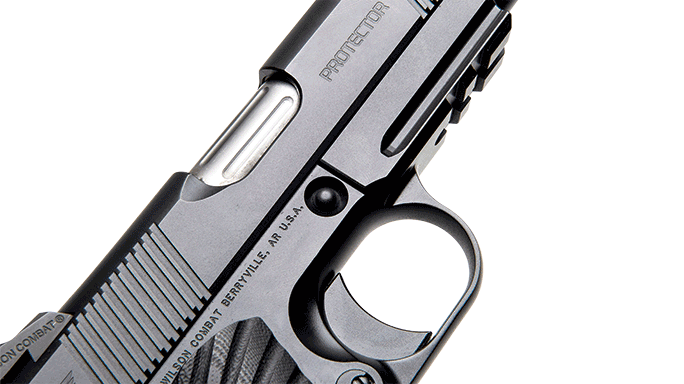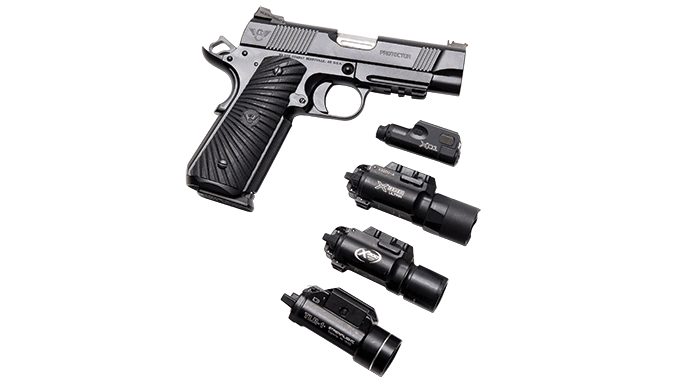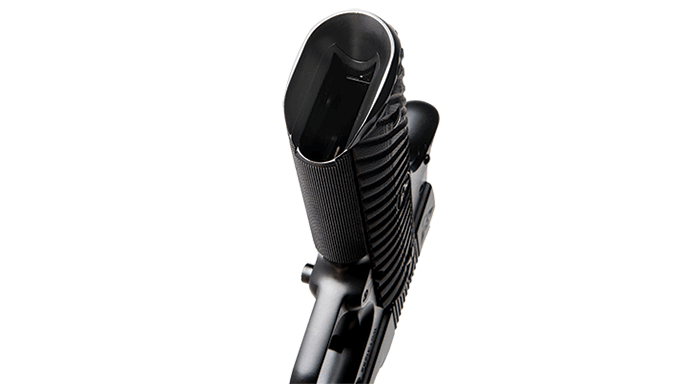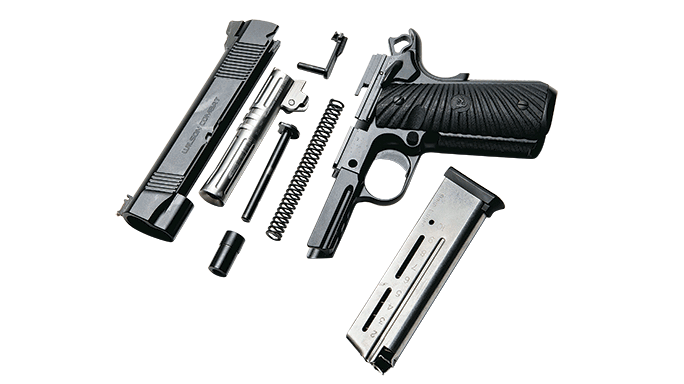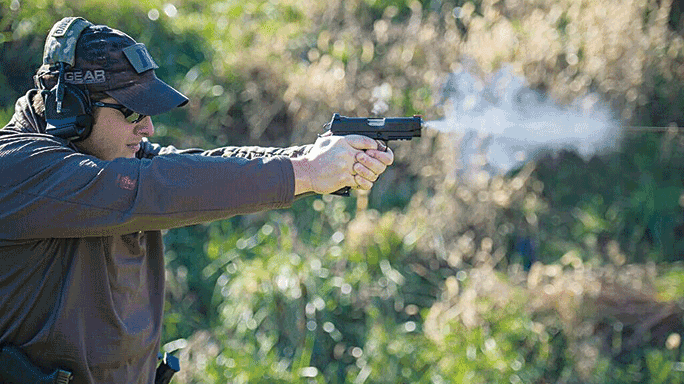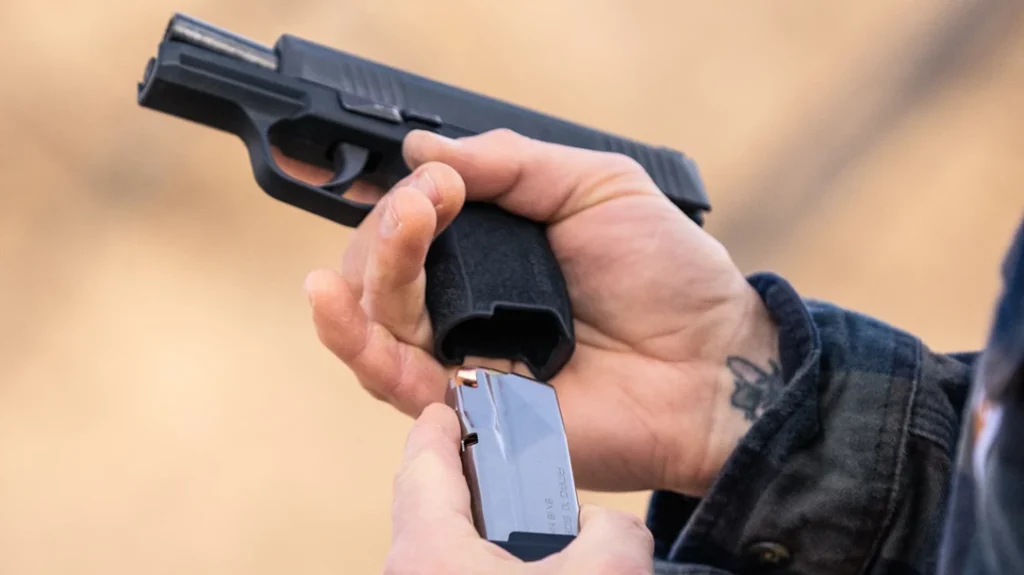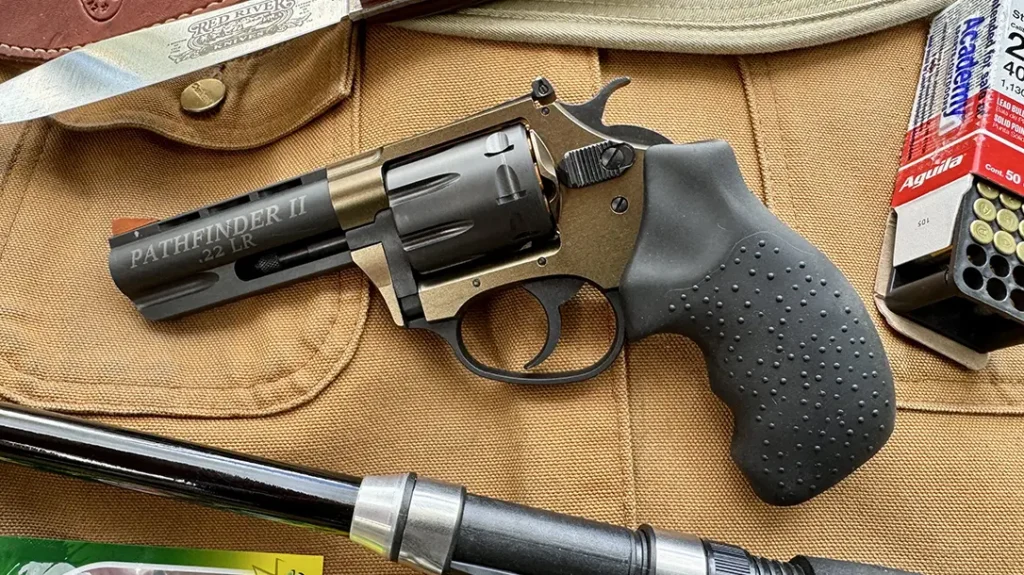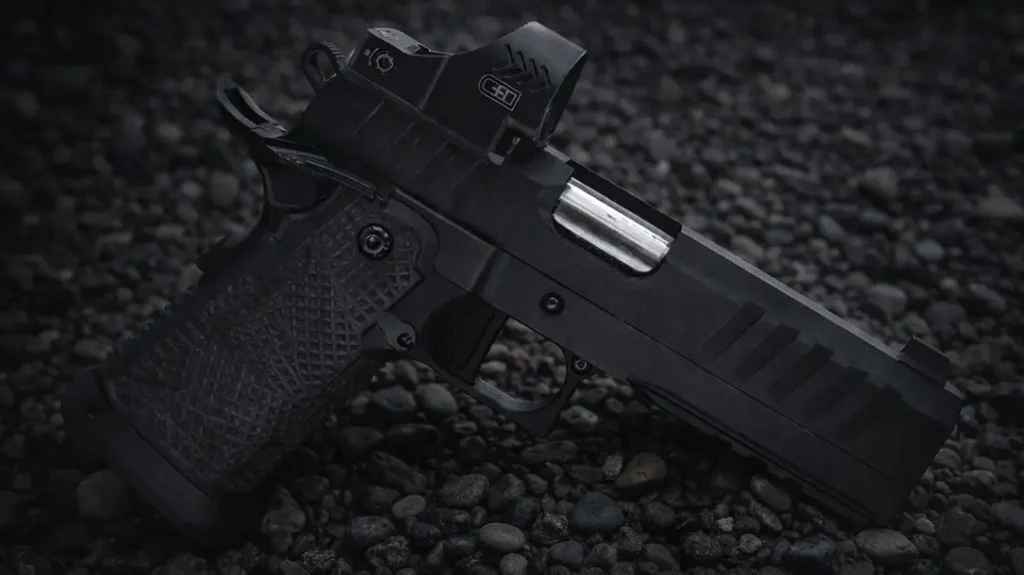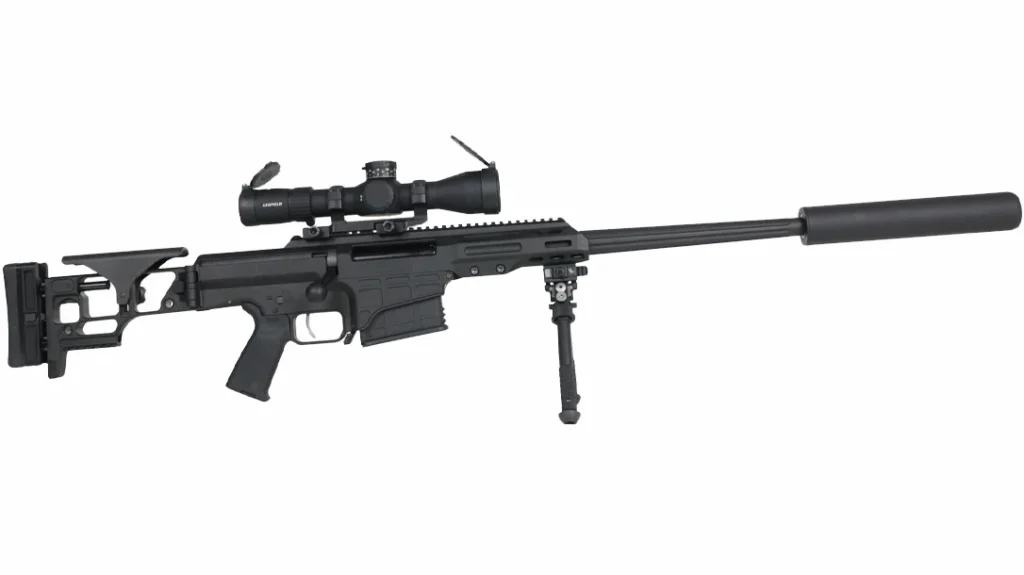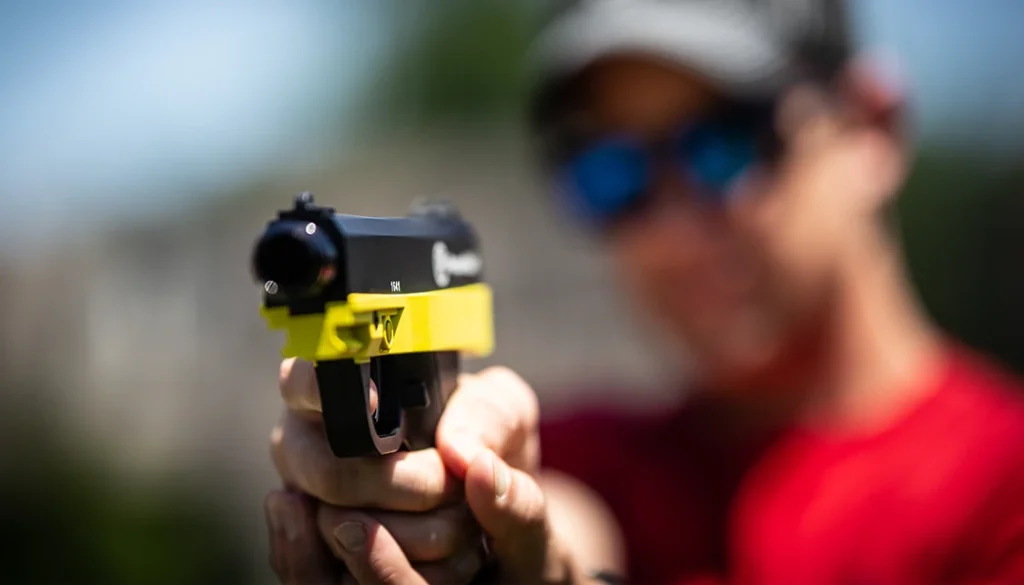Experienced 1911 shooters recognize Wilson Combat as a company known for its quality, hand-finished renditions of arguably the most respected pistol of all time. The Wilson Combat Protector offers a multitude of custom options in a production pistol and comes chambered in either .45 ACP or 9mm. Touted as a pistol that will “help you own the night in every possible fighting scenario” with “legendary accuracy and detailing,” the Protector aims to fill a critical role and look good doing it. Does the Protector achieve its design mandate as “the ultimate modern tactical handgun”? Let’s take a closer look.
First Impressions of the Wilson Combat Protector Professional
Wilson Combat offers three configurations of the 2015 Protector in two different calibers. The company sent us the light-railed, steel-framed Professional model chambered in 9mm. The Professional has a full-sized frame but with a more compact, 4-inch-barreled slide (the other two configurations include the Full-Size with a 5-inch-barreled slide and the Compact with a compact frame and a 4-inch-barreled slide). Besides frame/slide configuration and caliber choice, what Wilson Combat offers as “standard” on the Protector is an impressive list of what most would consider custom options.
Advertisement — Continue Reading Below
The Details
Pulling the pistol from its embroidered nylon case offered the first tactile and visual clues as to its quality, as my hand grasped the Protector’s G10 Starburst grip panels, its high-cut, 30-line-per-inch, checkered frontstrap, its Bullet Proof beavertail grip safety and round-butt magazine well. The stainless, fluted cone barrel caught my eye next with a promise that this was far from an average 1911.
Moving my support hand towards the slide presented a pleasant choice: Grip the rear serrations or the uniquely styled, abbreviated front cocking serrations? With that decision made, racking the slide revealed an action so smooth it left little doubt that the most expert of hands fit the Protector’s frame, slide and barrel.
Locking the slide to the rear offered a better look at the fluted cone barrel and full-length guide rod. Depressing the slide release left the skeletonized hammer cocked and urged me to engage the tactical thumb safety. Both the Bullet Proof slide release and thumb safety have nicely rounded edges for snag-free carry; they also engaged and disengaged with the crispness I expect from precisely fitted parts.
Advertisement — Continue Reading Below
Inserting the 10-round 9mm magazine provided an appreciation for the magazine well. Also part of the Bullet Proof line, the magazine well/mainspring housing is superbly mated with the Protector’s frame. Its rounded butt adds to the overall aesthetics of the pistol and reduces its profile for concealed carry. The magazine ejected expediently thanks to the smooth action of the high-quality Bullet Proof magazine release.
Coming Into Sight
Several things came into view while I took an initial sight picture. The Wilson Combat rear Battlesight is beefy. It’s clearly built tough with a U-notch aperture and horizontal serrations to eliminate glare. Two setscrews secure the sight in its dovetail, and a defined shelf cut (as opposed to a ramp) allows a shooter with a disabled support hand to place the rear sight on the heel of a shoe, a belt, a holster or the edge of a table to effectively rack the slide with one hand for an emergency reload.
Wilson designed the fiber-optic front sight on this particular Protector to give the shooter an even smaller “dot” for more precise aiming. Preferred by many competition shooters, fiber-optic sights work well in bright daylight, but they provide no benefit in low-light situations. In many ways, this pistol’s front sight design stands in stark contrast to its rear sight design. Swapping the standard front sight for one with a tritium insert might be a more practical choice when trying to “own the night.”
Advertisement — Continue Reading Below
While focused on the initial front sight picture, my peripheral vision picked up on the fact that the rear of the slide is serrated. These, like the 30-lpi serrations along the top of the Protector’s slide, help reduce glare while aiming in bright sunlight. The 40-lpi serrations span not only the rear of the slide but also the pistol’s ejector—another example of the detailed hand-fitting found throughout the 2015 Protector.
Remaining Features
With a triple visual and physical check to ensure an empty chamber and a well-chosen safe backdrop, my index finger found its place on the medium-length trigger pad and started its press. The short take-up and clean break preceded a manual rack of the slide, followed by a positive and audible reset of the trigger. Wilson Combat boasts a 3.5- to 4.5-pound trigger pull for this pistol. This Professional Protector chambered in 9mm averaged 4.37 pounds measured over five pulls with a Lyman trigger gauge.
With only a casual glance at the Protector one might miss some of the more subtle details found on closer inspection: The countersunk slide stop; the sharp-edge-taming bevel of the trigger guard, frame and slide, and the heavy machine chamfer applied along the bottom side of the slide. Custom details like these add to the cost of the Protector. However, they also each have a specific purpose in making this pistol an everyday-carry piece.
Advertisement — Continue Reading Below
Overall, my initial impression of the Protector Professional left me, well, impressed. Wilson Combat’s tradition of exquisitely hand-built, custom 1911s is evident in every detail.
Let There Be More Light
In preparation for a visit to the range with the Wilson Combat Protector Professional, I pulled out the brand-new SureFire XC1 weapon light that arrived just in time for this review.
I thought the fault was mine initially. A brand-new pistol and brand-new weapon light in the hands of a sometimes-not-so-bright knuckle dragger. I tried a Surefire X300U, X300 and a Streamlight TLR-1. None of them fit. The light rail on the frame of the pistol was too short to accommodate any of these popular weapon lights.
Advertisement — Continue Reading Below
A quick check of the Protector’s specifications on the Wilson Combat website revealed that the Professional and Compact model light rails are compatible only with Streamlight’s TLR-3. The TLR-3 is a compact, polymer-bodied weapon light that produces 125 lumens.
To The Range
Wilson Combat claims the Protector will achieve a 1.5-inch group at 25 yards. Testing this pistol proved what I already suspected: The Protector’s accuracy is hindered only by my abilities from 25 yards. Standing off-hand produced a group at the 25 that more than satisfied any standard for a combat pistol. Using support at this distance tightened that shot group up even more.
Shooting a steel-framed 1911 in 9mm feels incredible when compared to the .40 S&W Glock I carry on-duty everyday. With minimal recoil, follow-up shots come quickly. This Protector’s 4.3-pound trigger also had me cursing the mandated NY1 trigger in my G22. Honestly, I cannot think of a more satisfying pistol to shoot on the square range than a well-tuned, steel-framed 1911.
Advertisement — Continue Reading Below
The Final Analysis
As a well-built pistol with dozens of hand-fit custom features, the Wilson Combat Protector is top notch. 1911 enthusiasts will appreciate every design detail and won’t give a second thought to the $3,875 to 3,985 price tag.
In the end, the Wilson Combat Protector Professional featured here is better suited for competition in IDPA’s Concealed Carry Stock Service Pistol and Enhanced Service Pistol divisions. By my measurements, the pistol fits within IDPA’s test box dimensions, and it weighs 37.5 ounces unloaded. Standard options like this Protector’s fiber-optic front sight are better suited in a competition environment seeking merely to mimic possible real-world situations.
For those looking to outfit the Protector Professional for all-around concealed carry or duty use, you may want to consider ordering yours from Wilson Combat with their optional tritium front sight. The tritium front sight is more robust than the standard fiber optic front sight. It also glows in dark areas for enhanced low light and nighttime use. For more information on the Wilson Combat Protector Professional, please visit WilsonCombat.com.
